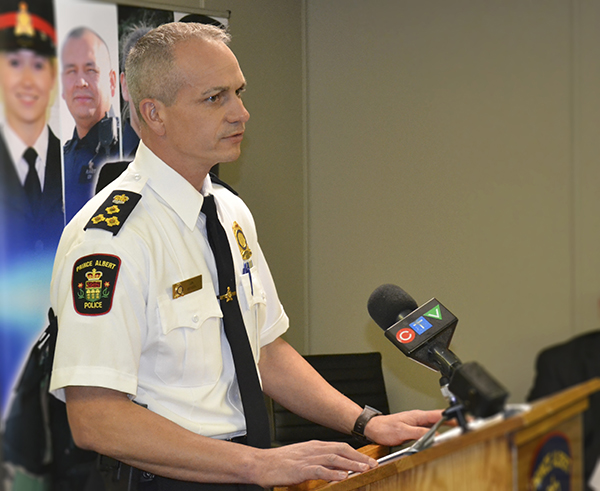
Jayda Noyes, Daily Herald
Police officers and mental health professionals are teaming up to better respond to those in mental health crises.
The Police and Crisis Team (PACT) consists of two police officers, two social workers and a psychiatric nurse.
According to police Chief Jon Bergen, mental health calls take an average of just under two hours. With the development of PACT, he said he’s hoping police can respond to more people.
Another goal of the initiative is to reduce the individuals going to the emergency department, explained Saskatchewan Health Authority’s integrated northern health vice-president, Andrew McLetchie.
“What we were seeing is people being responded to by the police, being brought to the ER and then being seen by ER physicians, and it’s maybe not the best way to always deal with every type of mental health crisis,” he said.
For Bergen, it addresses a topic woven into many other issues, including family disputes and addictions.
So far in 2018, the police have had 244 calls for attempted suicide, 154 mental health-related calls and 43 mental health warrants of apprehension.
“When we look at these numbers, we know that there’s some sort of daily occurrence, whether it be mental health or addictions, (they’re) absolutely tied closely together,” he said.
Saskatoon and Regina have already implemented the team.
Between April 2017 and June 2018, Saskatoon’s PACT provided 922 interventions and diverted 234 patients from the emergency department. Regina, on the other hand, provided 658 interventions and diverted 192 patients from the emergency department.
“We know that it works,” emphasized Bergen.
Crown investments minister and Prince Albert Carlton MLA, Joe Hargrave, said the province is providing $980,000 in funding.
It’s being split between Prince Albert and three other municipalities launching PACT—North Battleford, Moose Jaw and Yorkton.
“This is what’s really going to help these people and so that we’re treating them properly, you know, that we’re not just throwing them into the criminal justice system and saying ‘What happens, happens.’ No, we don’t want that outcome,” said Hargrave.
According to Bergen, PACT has gone on 11 calls since September, but training for the police officers is still in the early stages.
“A lot of what they’ve done in the first couple of weeks of their roles is identifying the process, the standard operating procedures around PACT, where they’re going to be used, how they’re best going to be used, the training (and) where they’re going to receive training,” he said.
He added the team has shown to reduce stress on officers dealing with mental health crises.

